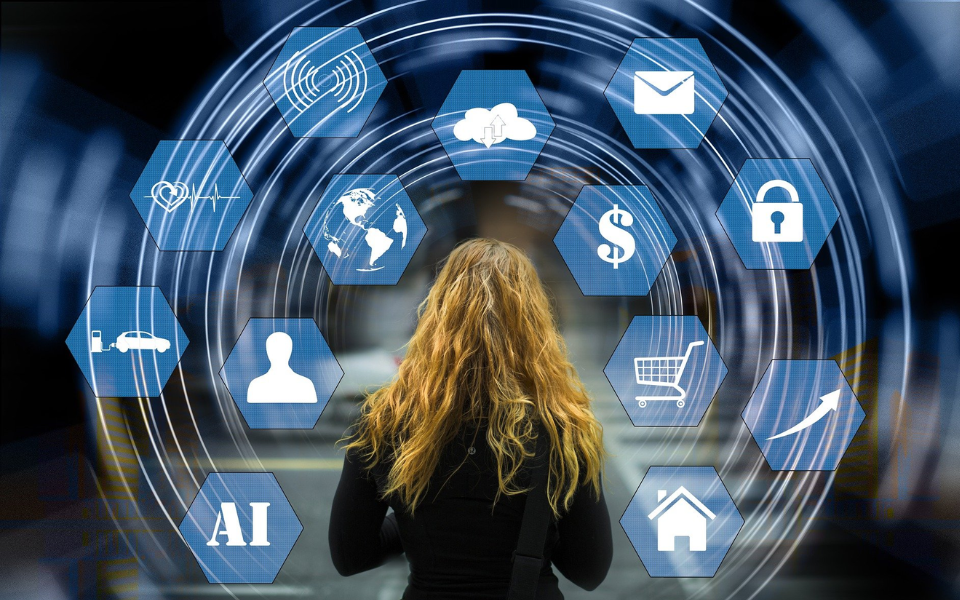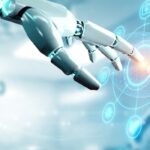Artificial Intelligence (AI) has rapidly evolved from a once-distant concept rooted in science fiction to an integral force shaping our everyday life. What was once considered futuristic is now embedded in the tools and systems we use daily—often in ways we don’t even notice. From unlocking our smartphones with facial recognition to receiving personalized movie recommendations, AI has quietly woven itself into the very fabric of modern living.
Its influence spans countless sectors of society, revolutionizing the way we live, work, communicate, learn, and entertain ourselves. Whether it’s optimizing public transportation systems, enhancing the accuracy of medical diagnostics, or powering smart home devices, AI plays a critical role in improving convenience, productivity, and decision-making across all aspects of life.
As AI continues to advance, its applications are becoming more powerful, more accessible, and more central to personal and professional routines. However, with these innovations also come new challenges—ethical concerns, privacy implications, and questions about the future of employment in an increasingly automated world.
This article explores how AI is transforming various dimensions of everyday life, delving into real-world applications, practical benefits, societal impacts, and potential risks. We will also address some of the most frequently asked questions about AI’s influence and its future, followed by a concise conclusion and key takeaways to help readers better understand and navigate the AI-driven world.
Key Takeaways
- AI is embedded in many daily technologies, often behind the scenes, improving user experiences and operational efficiency.
- Healthcare, transportation, education, and entertainment are major sectors benefiting from AI innovation.
- Ethical considerations such as privacy, bias, and accountability are critical to responsible AI adoption.
- Preparing for the AI future involves education, skill development, and active engagement with technology’s societal impact.
- AI complements rather than replaces human intelligence, providing tools for enhanced decision-making and creativity.
- Awareness of AI’s benefits and challenges enables individuals and organizations to harness its potential safely and effectively.
- The collaboration between technology developers, policymakers, and users is essential for sustainable AI progress.
Introduction to AI and Its Ubiquity
Artificial Intelligence refers to the development of computer systems capable of performing tasks that traditionally require human intelligence. These include learning from data, understanding natural language, recognizing patterns, making decisions, and even exhibiting creativity.
Today, AI powers many technologies and services that people interact with daily, often without realizing it. It personalizes content on social media, recommends products in online stores, filters spam emails, helps navigate traffic, and even supports critical healthcare decisions. The ongoing integration of AI into daily routines exemplifies how technology enhances efficiency, convenience, and innovation.
AI in Communication and Social Interaction
Artificial Intelligence has profoundly transformed communication and social interaction, becoming an inseparable part of daily life. It enriches how people connect, share information, and manage their routines, making life more convenient and interactive. Two of the most visible AI applications in this realm are virtual assistants and chatbots, alongside AI-powered content personalization on social media platforms.
Virtual Assistants and Chatbots
Virtual assistants like Apple’s Siri, Amazon’s Alexa, Google Assistant, and Microsoft’s Cortana have become a staple in modern life. These AI-driven helpers utilize advanced natural language processing (NLP) and machine learning (ML) techniques to interpret and respond to voice commands in a way that feels intuitive and natural. They assist users by managing calendars, sending messages, setting reminders, playing music, controlling smart home devices, and answering a vast array of questions about everyday life.
Incorporating virtual assistants into everyday life saves valuable time and effort, allowing users to multitask more effectively. For example, a busy professional can ask their virtual assistant to schedule meetings, check traffic, or read emails without disrupting their workflow or daily routine. Similarly, in home life, virtual assistants help adjust lighting, thermostat settings, or even order groceries, demonstrating how AI integration makes everyday living smoother and more efficient.
On a larger scale, AI-powered chatbots enhance customer service experiences by providing immediate, 24/7 support. These chatbots are embedded in websites, apps, and social media platforms to assist users with troubleshooting, booking appointments, answering frequently asked questions, and guiding customers through complex processes. By automating these routine interactions, chatbots improve life by reducing wait times and ensuring consistent, reliable responses. This allows human agents to focus on more nuanced, complex issues that require empathy and critical thinking, ultimately improving the overall quality of service.
Virtual assistants and chatbots together create an AI-supported communication ecosystem that seamlessly integrates into personal and professional life, offering convenience, speed, and enhanced interaction.
Social Media and Content Personalization
Social media has become a dominant force in modern life, shaping how people connect, share, and consume information. Behind the scenes, AI algorithms play a pivotal role in curating and personalizing content to fit individual preferences, thus shaping the user’s online life experience.
Platforms like Facebook, Instagram, TikTok, and Twitter use sophisticated AI recommendation systems that analyze vast amounts of data related to user behavior, interests, and interactions. These algorithms track what users like, share, comment on, and watch, learning continuously to tailor the content feed in a way that maximizes engagement and satisfaction. This personalized content helps users discover relevant posts, advertisements, videos, and news, making their social media experience more enjoyable and relevant to their life interests.
The impact of AI-driven content personalization extends to how people stay informed and entertained, influencing daily life choices and perspectives. For example, AI-curated news feeds keep users updated on topics they care about, while personalized ads introduce products and services tailored to their needs and preferences, often enhancing convenience in shopping and decision-making.
However, this personalization comes with challenges affecting social life. The algorithms can create “filter bubbles” or “echo chambers,” where users are primarily exposed to content that aligns with their existing beliefs and opinions. This selective exposure can limit the diversity of viewpoints and reinforce biases, potentially impacting social discourse and personal perspectives. Understanding and mitigating these effects is critical to ensuring AI supports a balanced, informed life.
In summary, AI in communication and social interaction has woven itself deeply into the fabric of daily life. Virtual assistants and chatbots streamline routine tasks and improve access to services, while AI-powered content personalization shapes how individuals engage with information and communities online. Together, these technologies enhance convenience, connectivity, and personalization but also call for mindful awareness to maintain a healthy, well-rounded social life.
AI in Healthcare
Artificial Intelligence is revolutionizing healthcare, significantly improving the quality and accessibility of medical services that impact human life every day. AI technologies streamline diagnostics, personalize treatments, and enhance patient care, making a tangible difference in life expectancy, wellness, and medical outcomes.
Diagnostics and Medical Imaging
AI algorithms assist doctors by analyzing complex medical images such as X-rays, MRIs, and CT scans with remarkable precision. Powered by deep learning, these tools can detect anomalies—such as tumors, fractures, or infections—much earlier than traditional methods. Early detection is crucial in saving lives and improving prognosis, as timely intervention can drastically change the course of many diseases.
Beyond imaging, AI supports predictive analytics by examining large datasets of patient information to forecast potential disease outbreaks or individual patient deterioration. This capability enables healthcare providers to initiate preventive measures, manage resources effectively, and ultimately save lives by shifting the focus from treatment to prevention.
Personalized Medicine
AI-driven machine learning models analyze patient genetics, lifestyle choices, environmental factors, and medical history to tailor treatment plans specific to each individual. This approach, known as precision medicine, optimizes therapeutic efficacy and reduces adverse reactions, profoundly improving quality of life.
By considering the unique characteristics of each patient’s life, personalized medicine ensures that treatments align closely with their biological and lifestyle context, paving the way for more effective, life-enhancing healthcare.
Virtual Health Assistants
AI-powered health applications are increasingly prevalent in daily life, offering symptom checking, medication reminders, mental health support, and chronic disease management. These virtual health assistants provide continuous monitoring and personalized guidance, making healthcare more accessible, especially for people in remote or underserved areas.
By promoting proactive health management, AI technologies empower individuals to take charge of their well-being, extending healthier and more active lives.
AI in Transportation
The transportation sector is undergoing a transformative shift driven by AI, reshaping how people move through cities and countries and directly affecting daily life and safety on the roads.
Autonomous Vehicles
Self-driving cars stand as one of the most anticipated and life-changing AI applications. Equipped with sensors, cameras, and complex AI models, autonomous vehicles interpret their surroundings, make real-time driving decisions, and navigate safely through dynamic environments.
Although fully autonomous cars are still under development and testing, many vehicles on the road today incorporate AI features like adaptive cruise control, lane-keeping assistance, and automated parking. These innovations reduce driver fatigue, improve safety, and enhance the overall driving experience, directly impacting the daily life of commuters and travelers.
Traffic Management and Navigation
AI algorithms analyze vast amounts of traffic data to optimize traffic signal timings, reducing congestion and minimizing travel time. This improves life quality by decreasing pollution and stress associated with long commutes.
Navigation apps powered by AI, such as Google Maps and Waze, provide real-time traffic updates and route optimization. These technologies save time and make commuting smoother, enhancing everyday life by allowing individuals to reach their destinations efficiently.
AI in Education
AI’s influence on education is reshaping how students learn and educators teach, creating more personalized and inclusive learning environments that enhance the life experience of learners worldwide.
Personalized Learning
AI-powered educational platforms adjust to each student’s unique learning style, pace, and strengths. By analyzing student performance, these systems provide customized exercises and resources that target areas needing improvement.
This individualized approach helps students build confidence and mastery at their own pace, significantly improving the quality of their educational life and outcomes.
Administrative Efficiency
AI automates time-consuming tasks such as grading, attendance tracking, scheduling, and resource allocation. This automation frees educators to dedicate more time to mentoring and engaging directly with students, enhancing the educational experience and fostering a richer learning life.
Accessibility
AI technologies, including speech recognition and real-time translation tools, break down barriers for students with disabilities or those who speak different languages. By making education more accessible, AI contributes to equalizing opportunities and enriching the life experiences of diverse learners.
AI in Entertainment and Leisure
AI’s role in entertainment and leisure transforms how people enjoy their free time, making experiences more engaging, personalized, and creative.
Content Recommendations
Streaming platforms like Netflix, Spotify, and YouTube use AI to analyze user preferences and consumption habits, offering personalized recommendations. By tailoring content to individual tastes, AI ensures that leisure time is filled with enjoyable and relevant entertainment, enriching everyday life.
Game Development
AI enhances gaming by creating intelligent non-player characters (NPCs) that respond dynamically, making gameplay more challenging and immersive. Procedural generation of game environments powered by AI provides unique experiences for players every time they play, elevating gaming as a form of entertainment and social life.
Creative Arts
AI tools assist artists, musicians, and writers by offering new ways to compose music, generate images, or brainstorm ideas. These technologies expand creative boundaries, providing new avenues for artistic expression and enabling individuals to enrich their personal and cultural life through innovative creations.
In all these areas—healthcare, transportation, education, and entertainment—AI profoundly impacts the quality and richness of everyday life, providing benefits that touch millions of people around the globe. However, as AI’s presence in life grows, so does the importance of ethical development and responsible use to maximize benefits while minimizing risks.
AI in Everyday Home Life
| Aspect | Description | Benefits to Everyday Life |
|---|---|---|
| Smart Thermostats | AI-powered thermostats (e.g., Nest, Ecobee) learn user preferences and automatically adjust temperatures based on behavior, weather, and occupancy. | Enhances comfort, reduces energy bills, and promotes sustainable living by optimizing energy use. |
| Smart Lighting | AI systems adjust lighting based on time of day, room occupancy, and personal preferences. Integration with voice assistants allows easy, hands-free control. | Improves convenience, reduces electricity usage, and supports health with natural circadian rhythm alignment. |
| Home Security Systems | AI-driven cameras and sensors use facial recognition, motion detection, and real-time alerts to identify threats and notify homeowners or emergency services. | Increases personal safety, deters crime, and provides peace of mind when at home or away. |
| Smart Appliances | AI-enabled appliances like refrigerators, washing machines, and ovens can monitor usage, suggest settings, and even perform self-diagnostics for maintenance. | Saves time, reduces manual effort, and extends appliance life with predictive maintenance alerts. |
| Voice-Activated Assistants | Devices like Alexa and Google Assistant serve as central hubs for smart home control, capable of handling routines, reminders, and entertainment. | Streamlines daily tasks, improves accessibility, and enhances quality of life for all household members. |
| Personalized Shopping | AI analyzes user data—browsing history, purchase habits, preferences—to recommend products and forecast needs on platforms like Amazon, eBay, and grocery apps. | Saves time, enhances the shopping experience, and ensures availability of products suited to individual needs. |
| Dynamic Pricing & Promotions | Retailers use AI to offer real-time discounts, bundle deals, and pricing strategies based on customer behavior and market trends. | Offers cost savings and personalized deals, making everyday shopping more economical and satisfying. |
| Inventory Management (Home Use) | AI in smart refrigerators or pantry apps tracks consumption and suggests reordering or recipe ideas based on available ingredients. | Reduces food waste, simplifies meal planning, and helps manage grocery budgets more efficiently. |
Ethical and Societal Implications of AI
While AI offers tremendous benefits, it also brings challenges:
- Privacy: The extensive data AI requires raises concerns about surveillance and data misuse.
- Bias: AI systems trained on biased data can perpetuate discrimination.
- Job Displacement: Automation threatens certain job categories, necessitating workforce reskilling.
- Accountability: Determining responsibility in AI-driven decisions is complex.
Addressing these issues requires transparent AI development, ethical guidelines, and inclusive policies.
Also Read : What Are the Latest Trends in Information Technology?
Conclusion
AI’s impact on everyday life is expansive and transformative. It enhances convenience, efficiency, and personalization across communication, healthcare, transportation, education, entertainment, and home environments. However, this technology also poses ethical, social, and economic challenges that must be proactively managed.
As AI continues to evolve, its integration into daily routines will deepen, requiring individuals, businesses, and governments to collaborate in ensuring that AI development aligns with human values, privacy, fairness, and societal well-being.
FAQs
1. How does AI affect job opportunities?
AI automates routine tasks, which can displace some jobs but also creates new roles in AI development, data analysis, and AI maintenance. It emphasizes the need for continuous learning and adaptation.
2. Is AI safe to use in everyday applications?
Most consumer AI applications are safe, but users should remain cautious about data privacy and ensure they use trusted platforms.
3. Can AI replace human decision-making?
AI assists decision-making by providing data-driven insights but is not a full substitute for human judgment, especially in complex ethical or emotional contexts.
4. How does AI improve healthcare outcomes?
AI accelerates diagnosis, personalizes treatment, and improves patient monitoring, leading to better health outcomes and reduced costs.
5. What is the role of AI in education?
AI personalizes learning, automates administrative tasks, and increases accessibility, helping create more effective and inclusive education systems.
6. Are AI recommendations biased?
AI can reflect biases present in training data, which requires careful dataset selection, algorithm auditing, and continuous improvement to mitigate.
7. How can individuals prepare for an AI-driven future?
Developing digital literacy, learning AI-related skills, and staying informed about AI trends are crucial to thrive in an AI-integrated world.


